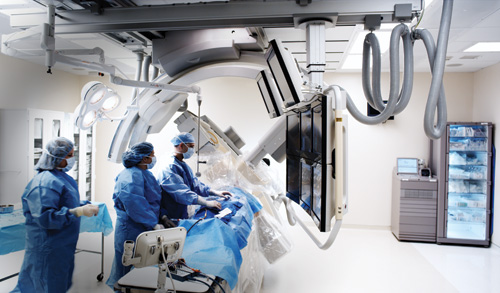The Different Roles In An EP Lab

Working in an electrophysiology (EP) lab can be challenging and rewarding. From the physicians performing the catheterizations to the nurses managing the instruments and the rest of the OR, there is a role for anyone who wants to be part of a dynamic team that saves and improves lives. Below is an overview of careers in the EP lab along with a brief look at what goes on behind the lab doors.
An EP lab is a medical operating suite in which the electrical conduction of the heart is tested and in which medical diseases that affect conduction are treated. Common procedures in the EP lab include cardiac mapping to detect abnormal electrical activity, ablation studies to block abnormal electrical currents, pacemaker implantation, and defibrillator implantation.

Physicians who specialize in the conduction of electrical impulses in the heart are called electrophysiologists. After medical school, they must perform eight years of residency and fellowship training to be qualified to work in an EP lab. Electrophysiologists are considered sub-specialists because they focus on a single aspect of a single organ. Only large medical centersemploy electrophysiologists.
There are two general types of nurses in the EP lab, the scrub nurse and the circulating nurse. The scrub nurse is responsible for ensuring that the instruments that doctors need in order to perform a procedure are organized, sterile, and ready to go when the operation begins. The scrub nurse is also responsible for ensuring overall sterility of the operating environment.
The circulating nurse controls access to the OR to ensure sterility and assists the scrub nurse when new tools or materials are need. A circulating nurse will answer pages for those who can’t (because they are within the sterile field) and will generally manage the flow of the operating room by coordinating with other nurses and staff to ensure that as soon as one procedure is over, the next can begin.
Techs help to operate equipment. This many include x-ray machines, fluoroscopy equipment, or even EP equipment. Techs understand the ins and outs of the machines they work with so that they can provide immediate support when physicians need to confirm placement of a device, check for proper operation of a device, or simply rule out a problem. Techs are part health care provider and part operations specialist.
Despite all of their training, doctors may not know everything there is to know about a specific device. This is especially true for new products and upgraded devices. In these cases, a representative from the company that makes the device will be present in the OR to assist the doctor with any questions about the device and to ensure that proper technique is followed.
The roles within the EP lab encompass a variety of interests, educational pursuits, and job descriptions. The environment is one of camaraderie and professionalism, where the health of each patient depends on every team member being an expert at his or her job. It’s a fun, rewarding, interesting place to work.
